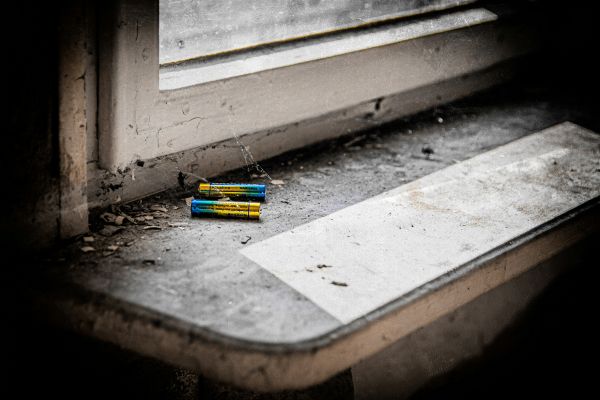Disposal Notice for Used Batteries
Note: Since our shipments may contain batteries and accumulators, we are obligated under the Battery Regulations (BattG) to inform you of the following:
 Batteries and accumulators must not be disposed of in household waste, but you are legally obliged to return used batteries and accumulators. Used batteries may contain hazardous substances that can harm the environment or your health if not stored or disposed of correctly. Batteries also contain valuable materials such as iron, zinc, manganese, or nickel and can be recycled. You can return the batteries after use, either to us or to nearby locations (e.g., at retailers or municipal collection points or at our shipping warehouse) free of charge. The collection at points of sale is limited to the usual quantity for end-users and old batteries that the distributor has or has had in their range as new batteries.
Batteries and accumulators must not be disposed of in household waste, but you are legally obliged to return used batteries and accumulators. Used batteries may contain hazardous substances that can harm the environment or your health if not stored or disposed of correctly. Batteries also contain valuable materials such as iron, zinc, manganese, or nickel and can be recycled. You can return the batteries after use, either to us or to nearby locations (e.g., at retailers or municipal collection points or at our shipping warehouse) free of charge. The collection at points of sale is limited to the usual quantity for end-users and old batteries that the distributor has or has had in their range as new batteries.
The symbol of the crossed-out wheeled bin means that you must not dispose of batteries and accumulators in household waste. Additionally, below this symbol, you will find the following symbols with the following meanings:
Pb: Battery contains lead
Cd: Battery contains cadmium
Hg: Battery contains mercury
 Used Batteries and Their Environmentally Friendly Disposal
Used Batteries and Their Environmentally Friendly Disposal
The correct disposal of used batteries is a crucial factor for environmental protection and sustainability. Batteries contain various chemicals and metals that can be environmentally harmful if not disposed of correctly. Therefore, it is important to understand why batteries should not be thrown into household waste and what alternatives are available.
Why should batteries not be disposed of in household waste?
Batteries contain a range of heavy metals such as mercury, lead, cadmium, and lithium, which can be harmful both to the environment and human health. If they end up in normal household waste, these hazardous substances can enter the environment and, for example, contaminate groundwater. Additionally, certain types of batteries, particularly lithium-ion batteries, can pose a fire risk if damaged or in contact with other materials.
How to correctly dispose of used batteries?
-
Use collection points: In the UK, there is an extensive network of collection points for used batteries, including supermarkets, chemists, and electronics stores, among others. These stores are legally required to accept used batteries free of charge. You will usually find dedicated collection boxes at the entrance or checkout.
-
Recycling centres and waste disposal sites: Many towns and cities also offer the option to drop off used batteries at recycling centres or waste disposal sites. They often accept other types of problematic waste as well.
-
Special collection campaigns: Some local authorities or organizations occasionally run special collection campaigns for batteries and other hazardous waste.
-
Proper storage at home: Until disposal, used batteries should be stored safely and dry. It is advisable to cover the terminals with tape to prevent short circuits, especially for lithium-ion batteries.
-
Follow instructions: On the batteries themselves and in stores, you will often find instructions for correct disposal.
What happens to the collected batteries?
After collection, the batteries are transported to specialized recycling companies. There, they are sorted and disassembled into their components. Valuable materials such as iron, zinc, or nickel can be recycled and used in the production of new products. This contributes to resource conservation and reduces the need to extract new raw materials.
Conclusion
The environmentally friendly disposal of used batteries is a simple but essential step in protecting our environment. By correctly disposing of used batteries, we help keep harmful substances away from the environment and preserve valuable resources. It is important to be aware of this responsibility and actively use the available disposal options.
 Batteries and accumulators must not be disposed of in household waste, but you are legally obliged to return used batteries and accumulators. Used batteries may contain hazardous substances that can harm the environment or your health if not stored or disposed of correctly. Batteries also contain valuable materials such as iron, zinc, manganese, or nickel and can be recycled. You can return the batteries after use, either to us or to nearby locations (e.g., at retailers or municipal collection points or at our shipping warehouse) free of charge. The collection at points of sale is limited to the usual quantity for end-users and old batteries that the distributor has or has had in their range as new batteries.
Batteries and accumulators must not be disposed of in household waste, but you are legally obliged to return used batteries and accumulators. Used batteries may contain hazardous substances that can harm the environment or your health if not stored or disposed of correctly. Batteries also contain valuable materials such as iron, zinc, manganese, or nickel and can be recycled. You can return the batteries after use, either to us or to nearby locations (e.g., at retailers or municipal collection points or at our shipping warehouse) free of charge. The collection at points of sale is limited to the usual quantity for end-users and old batteries that the distributor has or has had in their range as new batteries. Used Batteries and Their Environmentally Friendly Disposal
Used Batteries and Their Environmentally Friendly Disposal
